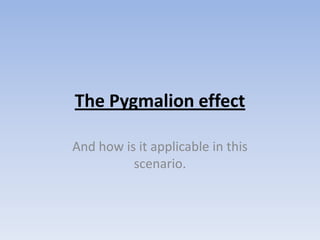
The pygmalion effect
- 1. The Pygmalion effect And how is it applicable in this scenario.
- 2. What is the Pygmalion effect? The phenomenon in which the greaterexpectation placed upon people (often children/students/employees), the better they perform. Ohhhhh and WHO is Pygmalion …… ? A Cypriot sculptor in a story by Ovid in Greek mythology, who fell in love with a female statue he had carved out of ivory.
- 3. The Who and the What of this study: WHO: Psychologists Robert Rosenthal and Lenore Jacobson (1968/1992) WHAT: When teachers expect students to do well and show intellectual growth, they do. The reverse is also true!! THUS: “Reality can be influenced by the expectations of others.”
- 4. The (famous) Oak School experiment Teachers were led to believe that certain students selected at random were likely to be showing signs of a spurt in intellectual growth and development. At the end of the year, students of whom the teachers had high expectations showed SIGNIFICANTLY GREATER gains in intellectual growth than did those in the control group. 12.22 point gain (expected group) vs. 8.42point gain (control group). Also known as: Expectancy advantage.
- 5. Before the Rosenthal-Jacobson study, there was the 1900s Hollerith tabulating machine … Inventor of the machine estimated that trained workers would be able to process about 550 cards a day After a period of training, workers could produce more than 550 cards a day, but at great emotional cost 200 new workers that joined the rank, and knew nothing about the machine/stress/strain, were able to tabulate 2100 cards a day, with no ill effects.
- 6. Self-fulfilling prophecies Faculty refuse to acknowledge that their latent expectations might be just self-fulfilling prophecies. Probably because such (upsetting) facts define a problem but are not accompanied with relevant solutions. Rosenthal admits: “We don’t know what we should do with these findings.”
- 7. Some possible implications in the classroom "If you think your students can't achieve very much, are perhaps not too bright, you may be inclined to teach simple stuff, do a lot of drills, read from your lecture notes, give simple assignments calling for simplistic factual answers; that's one important way it can show up."
- 8. What Rosenthal suggests … Without any prejudice, there is going to be the bell curve present in every class that you teach. Thus, Not everybody is going to be a star. That is a fact. BUT almost everybody can learn more than they are learning.
- 9. The importance of interpersonal communications Teachers communicate something vital and un-disguisable about their attitudes towards students and teaching in ways that transcend ordinary language. “How we believe the world is and what we honestly think it can become have powerful effects on how things turn out.” Pygmalion effect even in laboratory animals.
- 10. A moral conclusion (of the study) Fact: Superb teachers can teach the “unteachables”. What Rosenthal thinks the research shows is a Moral obligation for the teacher: If the teacher knows that certain students can’t learn, that teacher should get out of that classroom.
- 11. Linking the theory to the scenario Miss Rita had high expectations of the class, but it was merely assumptions on her own part. No external party re-affirm her ideas about the class’s abilities. Mr. Yeo suggested questions that she could ask, but offered no backing to her assumptions about the class’s abilities. Hence, the expectations did not elicit the Pygmalion effect.